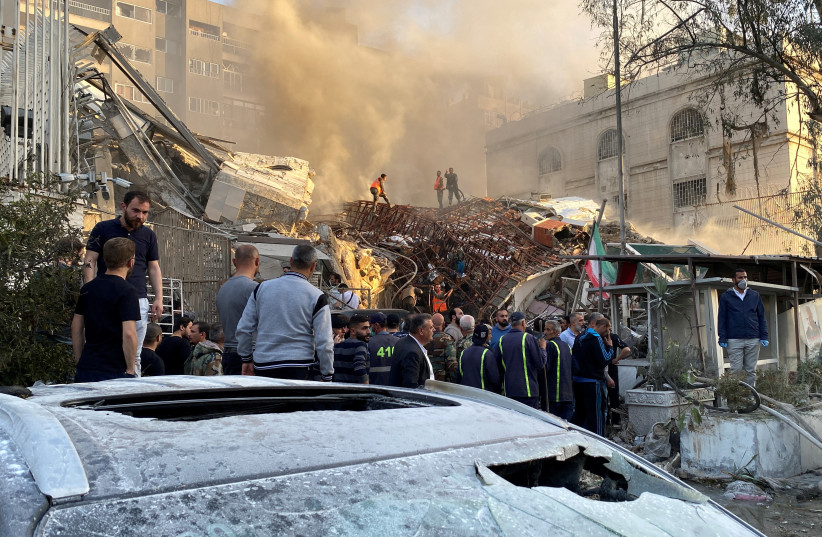The veneer of aggression that the Tehran government projects, particularly its threats of revenge against Israel and the US, appears increasingly to be more a facade than a reflection of genuine strength. This illusion was starkly exposed in the aftermath of a calculated, intelligence operation attributed to Israel in Damascus.
The operation was a response to an immediate threat and a clear indictment of Iran’s dangerous liaisons, highlighted by the recent visit of a Hamas terrorist leader to Tehran, warmly embraced by the regime’s highest officials. This incident underscores a grim reality: The existence of Israel and the safety of US soldiers in the region is threatened by Iran’s direct actions and the passive complicity of international policies.
The essence of the Islamic Republic’s foreign policy, ostensibly underpinned by diplomatic endeavors, is orchestrated by the military might of the Revolutionary Guard and Quds Force. The Foreign Ministry serves as a mere front, cloaking military and espionage operations under the guise of diplomacy. One must question the anomaly of such a military gathering adjacent to an embassy – if not for plotting terrorist operations against Israel and US interests in the region.
Amplifying Iran’s narrative are the regime’s media mouthpieces, operating within and outside Iran, particularly targeting the Persian-language media abroad. Acting in concert, those outlets echo the regime’s rhetoric, a clear manipulation aimed at shaping public perception to legitimize Iran’s defiance of international norms and its aggression.
The international community finds itself at a crossroads, grappling with the paradox of allowing the Islamic Republic to flout international laws with impunity, launching terrorist attacks at will, while its victims – Israel and the United States – are questioned for exercising their right to defend themselves.

The incident in Damascus where Israel’s targeted operation resulted in the elimination of key military figures, not diplomats, from a so-called “diplomatic” site, sheds light on Iran’s real malicious agenda. The site was far from being a hub of diplomacy; it was a nexus for planning and executing terror operations, a stark revelation of the regime’s priorities and strategies.
Silence from Tehran speaks volumes
The silence from Tehran following Israel’s precise strikes speaks volumes about the Islamic Republic’s actual capacity for retaliation. Internally, the regime of criminal mullahs faces a populace disillusioned and fatigued by years of economic mismanagement, corruption, and the oppressive quashing of dissent. The public’s disdain for the regime’s boastful defiance on the international stage and its failure to address domestic grievances has only deepened the chasm between the government and the governed.
Furthermore, the regime’s ideological war, marked by a relentless pursuit of regional dominance and the exportation of its revolutionary ideals, has left it increasingly isolated on the global stage. Its ambitious quest for a “strategic depth” stretching from Thailand to Venezuela is a testament to its delusional self-perception as a dominant power, unbounded by geographical constraints. This strategy, however, is not without its consequences, drawing the ire and scrutiny of the international community, while exposing the regime’s vulnerabilities and the fragility of its purported strength.
THE GLOBAL response to Iran’s provocations and its nuclear ambitions has been a topic of intense debate, underscored by a pressing need for a cohesive strategy that transcends military might. The challenge lies in curtailing Iran’s nuclear capabilities and in addressing its sponsorship of terrorism and its ideological crusade against the West. This necessitates a united front, a coalition of nations willing to stand up against Khomeinist ideology, supporting not just punitive measures but also empowering national movements within Iran that seek change.
The Islamic Republic’s bluster and posturing on the international stage mask a regime beset by internal strife and external pressures. Its threats, while menacing in tone, belie a stark inability to engage in a meaningful, sustained military confrontation with its adversaries. This disconnect between rhetoric and reality offers a window of opportunity for the international community to recalibrate its approach to Iran, moving beyond reactive measures to a more proactive, strategic engagement that addresses the root causes of instability emanating from Tehran.
In conclusion, the path forward requires a delicate balance between deterrence and diplomacy, leveraging the full spectrum of economic, political, and, if necessary, military tools at the disposal of the international community. The objective should not be merely to contain Tehran’s ambitions but to foster a conducive environment for change within Iran, one that prioritizes the welfare of its populace over the regime’s expansionist agendas.
As the region stands at a pivotal juncture, the actions of the international community will determine whether the future holds a continuation of the status quo or the dawn of a new era marked by stability, peace, and civility among nations.
The choice will shape the Middle East’s future and, with it, the prospects for a global order grounded in stability and mutual consideration.
The writer is a counterterrorism analyst and Middle East studies researcher based in Washington, with a particular focus on Iran and ethnic conflicts in the region. His new book is The Black Shabbat, published in the US. You can follow him at erfanfard.com and on X @EQFARD.
